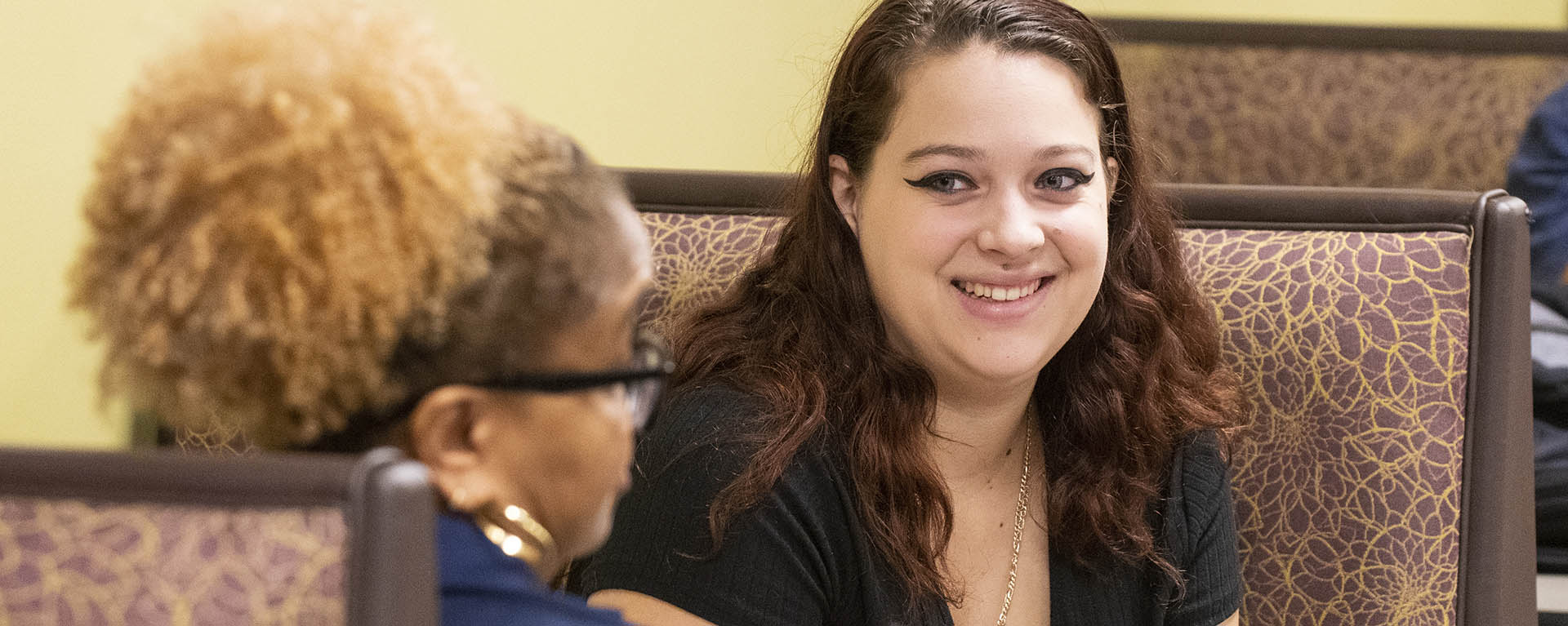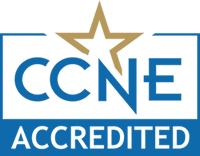
School of Nursing
Our Mission
Washburn University Harmony Hines School of Nursing mission is to prepare professional nurse leaders to provide quality healthcare to everyone.
History
The baccalaureate nursing program was established at Washburn University in the Fall of 1974. In 1982, the program was granted status as a School of Nursing through an act of the Legislature.

The baccalaureate degree program in nursing, Doctor of Nursing Practice program, and post-graduate APRN certificate program at Washburn University are accredited by the Commission on Collegiate Nursing Education (http://www.ccneaccreditation.org).
To continue to provide nursing education that addresses the future healthcare needs of the communities served by the School of Nursing, an Advisory Council was created in 2000. Advisory Council Members are asked to serve a minimum two year term and attend an annual meeting to review and provide input on the strategic direction of the School of Nursing.
Harmony J. Hines School of Nursing Advisory Board
- Adam Meier / Patricia Handley
- adam.meier@kutopeka.com / patricia.handley@kutopeka.com
- Chief Nursing Officer, University of KS Health St. Francis Campus
- Topeka, KS
- Trey George
- tgeorge@tha.gov
- President/CEO, Topeka Housing Authority
- Topeka, KS
- Kerri Moore
- kemoore@valeotopeka.org
- Director of Medical Services, Valeo Behavioral Health
- Topeka, KS
- Mindy Olberding
- mindyolberding@chcsks.org
- Chief Nursing Officer, Community Healthcare
- Onaga, KS
- Marsha Kent
- mkent@midlandcc.org
- Vice president of Clinical Services, Midland Hospice
- Topeka, KS
- Amy Kincade / Salena Gillam
- amy.kincade@stormontvail.org / SGillam@stormontvail.org
- Senior Vice President and Chief Nursing Officer / Vice President and Assistant Chief Nursing Officer, Stormont Vail HealthCare
- Topeka, KS
- Carrie Lutz
- carrie.saia@rhrjc.org
- Chief Executive Officer, Holton Hospital
- Holton, KS
- Annette Conrow / Natalie Zamulinski
- annette.conrow@ascension.org / natalie.zamulinski@ascension.org
- Vice President of Nursing & Operations, Ascension-Via Christi
- Manhattan, KS
- Crystal Stevens
- crystal.stevens@washburn.edu
- Dean, Washburn University
- Topeka, KS
- Jan Wiebe
- jan.wiebe@lmh.org
- VP of Nursing, Lawrence Memorial Hospital
- Lawrence, KS
- Brie Cantrell
- bacantrell@cmh.edu
- Nursing School Clinical Senior Manager, MOKAN/Children's Mercy
- Kansas City, KS
- Stephanie Gfeller
- stephanie@leadingagekansas.org
- Director of Professional Development & Leadership, Leading Age Kansas
- Topeka, KS
Pre-licensure BSN Program
RN-BSN Program
PMHNP Program
Doctor of Nursing Practice (DNP) Program
NCLEX First-Time Pass Rates
| Pass Rate | 2017 | 2018 | 2019 | 2020 | 2021 | 2022 | 2023 | 2024 |
|---|---|---|---|---|---|---|---|---|
| Washburn University Pass Rate | 85.38 | 90.70 | 89.78 | 86.89 | 83.22 | 79.72 | 91.55 | 97.5 |
| Kansas Pass Rate | 82.10 | 88.90 | 86.60 | 86.18 | 84.58 | 81.54 | 92.53 | 92.26 |
| National Pass Rate | 87.11 | 88.29 | 88.18 | 86.57 | 82.48 | 79.90 | 88.56 | 91.16 |
Data is taken from the Kansas State Board of Nursing Annual Reports.
*Data to come.
FNP First-Time Pass Rates
| Pass Rate | 2019 | 2020 | 2021 | 2022 | 2023 | 2024 |
|---|---|---|---|---|---|---|
| Washburn University Pass Rate | 82 | 92 | 100 | 82 | 71 | 93 |
| National Pass Rate | 82 | 89 | 91 | 75 | 73 | 84 |
Data is taken from the American Academy of Nurse Practitioners Certification Board
The School of Nursing strategic goals for 2020-2023
- Goal #1: Promote student success through implementation and evaluation of innovative learning environments and adaptive teaching strategies
- Teaching Agility
- Clinical Agility
- Goal #2: Promote student competencies to enable students to care for patients in a dynamic, complex environment with a deeper understanding of the various factors affecting the human condition
- Human Factors
- Ethics (w/ application to contemporary issues)
- Communication
- Clinical Reasoning
- Competency-based Education Model
- Goal #3: Expand faculty and program impact through engagement (teaching, scholarship, service) with the larger community
- Faculty Development
- Scholarship (Scientific Inquiry, Teaching, Practice, Community Engagement)
- Serving Community
- Goal #4: Promote sound fiscal decisions utilizing new and existing resources to maintain the mission of the School of Nursing
- Maintain current level of Federal grant funding
- Review all SON programs
- Strategically market the undergraduate and graduate nursing programs
Person is viewed as a dynamic and holistic being who is in continuous mutual process with the environment. Rather than a sum of parts, the person is a unique, complex, ever-evolving pattern of meaning, consciousness, and lived experience, with inherent dignity and worth. This view emphasizes the person's ability to make intentional choices, take purposeful action, and to shape their own health and knowledge through active participation towards achieving optimal health outcomes.
Environment is conceptualized as a dynamic and co-evolving presence that shapes and is shaped by an individual's lived experiences, values, and meanings. It cannot be separated from the person. The environment includes physical places, social relationships, cultural influences, and personal meaning, all of which interact simultaneously to influence learning, health, and the continuous process of personal growth and development. The environment often presents structural factors necessitating the advancement of health equity.
Health is a dynamic, unfolding pattern of wholeness and meaning that emerges through the simultaneous interaction of personal, relational, and environmental dimensions. Health is viewed as more than a static state or the mere absence of illness, but as a lived experience of becoming-shaped by the individual's capacity for reflection, presence, and shared understanding. Health is thus a personal and transformative process that supports growth.
Nursing is a dynamic and scholarly profession that integrates the art and science of caring, with a central focus on the protection, promotion, and optimization of health and human functioning. The practice of nursing draws upon theoretical frameworks, empirical evidence, and critical inquiry to guide its interventions and advance the field. It encompasses the prevention of illness and injury, the facilitation of healing, and the alleviation of suffering through compassionate presence. This holistic, relational, and intellectually rigorous approach positions nursing as an advocate in supporting human dignity, fostering well-being, and advancing health equity across the life-span in diverse settings.
Learning is fluid, evolving, and shaped by the learner's context and participation. It is an emergent process that occurs when thoughtful reflection, meaningful conversations, and experiences interact within clinical and educational environments. Nursing education is responsive to the educational needs of students, preparing them to practice with integrity, accountability, intentionality, and respect for human dignity.
GET IN TOUCH WITH School of Nursing
School of Nursing
Petro Allied Health Center
1700 SW College Ave.
Topeka, KS 66621-1117
Phone & Fax
785.670.1525
Fax: 785.670.1032

